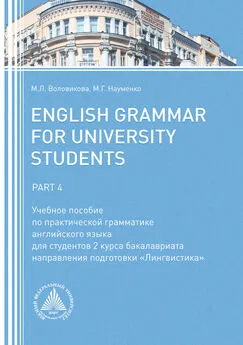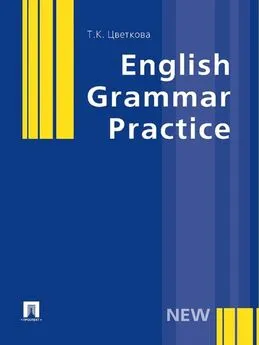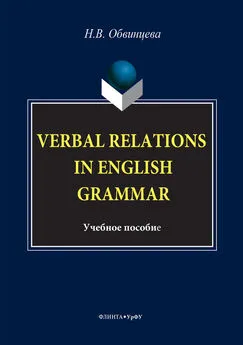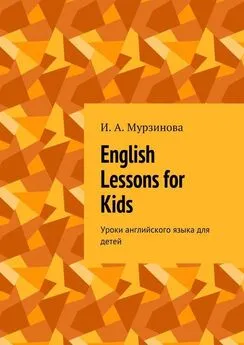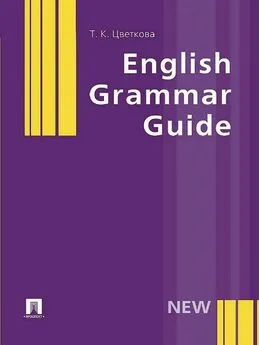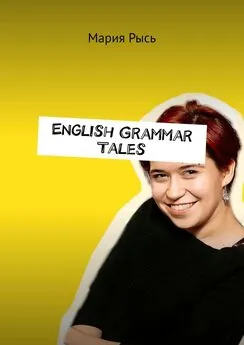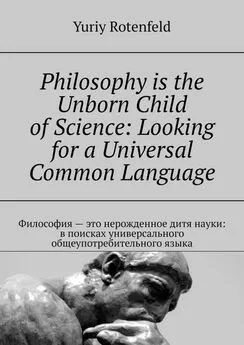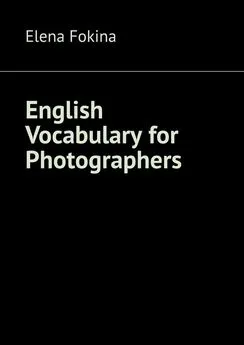Марина Науменко - English Grammar for University Students. Part 4
- Название:English Grammar for University Students. Part 4
- Автор:
- Жанр:
- Издательство:неизвестно
- Год:неизвестен
- ISBN:9785927526390
- Рейтинг:
- Избранное:Добавить в избранное
-
Отзывы:
-
Ваша оценка:
Марина Науменко - English Grammar for University Students. Part 4 краткое содержание
English Grammar for University Students. Part 4 - читать онлайн бесплатно ознакомительный отрывок
Интервал:
Закладка:
The cat looked up at me as if to say “I’m hungry.”
He nodded his head slowly as though to agree with everything she said.
He knows better than to marry her.
Adverbial modifier of conditiondenotes an action which pre-conditions the action expressed by the predicate. In this function the Infinitive is used but seldom.
To look at his works you would think that you have already seen them somewhere.
If to speak about teens, they stand somewhere between childhood and adulthood.
Parenthesis
The Infinitive used as parenthesis is usually part of a collocation, as in: to begin with, to be (quite) frank, to be sure, to make matters worse, to put it mildly, to say the least, to tell the truth, needless to say, strange to say, so to speak, to make a long story short, to crown all, to make matters worse, to be more precise, to say nothing of , etc.
When they had an accident, they were upset, to say the least.
John helps me with my taxes.He’s my accountant, so to speak.
Predicative constructions with the infinitive
The Infinitive is used in three types of predicative constructions:
The Objective with the Infinitive Construction.
The Subjective with thе Infinitive Construction.
The For-to-Infinitive Construction.
In all these constructions the Infinitive denotes an action ascribed to a noun or a pronoun. Due to their semantics and because of the attached position the nominal and the verbal elements are understood as forming a complex with subject-predicate relationship [Кобрина, Корнеева и др., 2009].
I saw him cross the street.
It is for him to decide.
He appeared to be a good doctor.
The objective infinitive construction
The Objective Infinitive Construction is a construction in which the Infinitive (usually the Infinitive phrase) is in predicate relation to a noun in the common case or a pronoun in the objective case.
The Objective Infinitive Construction is used as a complex object in the following cases:
1. After verbs of sense perception( to see, to hear, to feel, to watch, to feel, to observe, to notice and some others). Only Indefinite Infinitive without the particle ‘to’is used in this case.
We did not see her enter the room.
They watched me cross the street.
Note: If the verb to see or to notice is used with the meaning to understand, or the verb to hear with the meaning to learn, the Objective Infinitive Construction cannot be used. Here only subordinate object clause is possible.
I saw that they had nothing to say to me (Я понял, что…).
I hear your brother has returned from vacation (Я слышал, что…).
2. After verbs of mental activity(to know, to think, to believe, to consider, to suppose, to expect, to understand, to find and some others).
I expect the goods to be loaded immediately
He considers this question (to be) of great importance.
We found the breakfast she had cooked to taste very good.
3. After verbs denoting feelings and emotion( to like, to dislike, to love, to hate, and some others).
Конец ознакомительного фрагмента.
Текст предоставлен ООО «ЛитРес».
Прочитайте эту книгу целиком, купив полную легальную версию на ЛитРес.
Безопасно оплатить книгу можно банковской картой Visa, MasterCard, Maestro, со счета мобильного телефона, с платежного терминала, в салоне МТС или Связной, через PayPal, WebMoney, Яндекс.Деньги, QIWI Кошелек, бонусными картами или другим удобным Вам способом.
Интервал:
Закладка:
